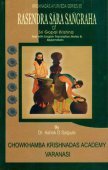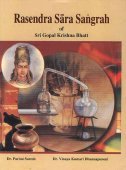Udarda: 8 definitions
Introduction:
Udarda means something in Hinduism, Sanskrit. If you want to know the exact meaning, history, etymology or English translation of this term then check out the descriptions on this page. Add your comment or reference to a book if you want to contribute to this summary article.
In Hinduism
Ayurveda (science of life)
Rasashastra (Alchemy and Herbo-Mineral preparations)
Source: archive.org: Rasa-Jala-Nidhi: Or Ocean of indian chemistry and alchemyUdarda (उदर्द) refers to erysipelas with fever, nausea, excess of phlegm, inflammation, etc. (see the Rasajalanidhi by Bhudeb Mookerji volume 3)
Unclassified Ayurveda definitions
Source: gurumukhi.ru: Ayurveda glossary of termsUdarda (उदर्द):—Shivering by cold or Urticaria

Āyurveda (आयुर्वेद, ayurveda) is a branch of Indian science dealing with medicine, herbalism, taxology, anatomy, surgery, alchemy and related topics. Traditional practice of Āyurveda in ancient India dates back to at least the first millenium BC. Literature is commonly written in Sanskrit using various poetic metres.
Languages of India and abroad
Sanskrit dictionary
Source: DDSA: The practical Sanskrit-English dictionaryUdarda (उदर्द).—[ard-arc] (In Medic.) Erysipelas (visarpa).
Derivable forms: udardaḥ (उदर्दः).
Source: Cologne Digital Sanskrit Dictionaries: Shabda-Sagara Sanskrit-English DictionaryUdarda (उदर्द).—m.
(-rdaḥ) Erysipelas. E. ud up, arda to go, ac aff.
Source: Cologne Digital Sanskrit Dictionaries: Monier-Williams Sanskrit-English DictionaryUdarda (उदर्द):—[=ud-arda] [from ud-ard] m. (in [medicine]) erysipelas, [Bhāvaprakāśa]
Source: Cologne Digital Sanskrit Dictionaries: Yates Sanskrit-English DictionaryUdarda (उदर्द):—(rdaḥ) 1. m. Erysipelas.
[Sanskrit to German]
Sanskrit, also spelled संस्कृतम् (saṃskṛtam), is an ancient language of India commonly seen as the grandmother of the Indo-European language family (even English!). Closely allied with Prakrit and Pali, Sanskrit is more exhaustive in both grammar and terms and has the most extensive collection of literature in the world, greatly surpassing its sister-languages Greek and Latin.
See also (Relevant definitions)
Starts with: Udardaprashamana.
Full-text: Udardaprashamana.
Relevant text
Search found 1 books and stories containing Udarda, Ud-arda; (plurals include: Udardas, ardas). You can also click to the full overview containing English textual excerpts. Below are direct links for the most relevant articles:
Rasa Jala Nidhi, vol 2: Minerals (uparasa) (by Bhudeb Mookerjee)
Part 4 - Uses of gairika < [Chapter IX - Uparasa (10): Gairika (red ochre)]
Related products



